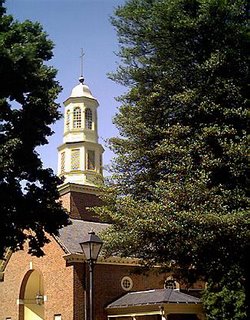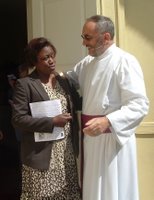
Those of us who are Apple Geeks (my first computer was an Apple II which I typed my BFA Thesis on) are all in awe of the Great and Wonderful Woz. He is legendary. Now he speaks in a new book which BabyBlue is having flown in as we speak from Amazon - stay tuned for the review. But in the meantime, here's an article from the San Francisco Gate (and if you click on the headline above, you can listen to a podcast from the Great Woz Himself!), including an exerpt from the new Woz Autobiography where he talks about what brought him and Steve Jobs together - yep, you guessed it! Mr. Dylan once again. It just figures that Dylan had to be the inspiration behind Apple. No wonder he did the iPod commercial. Here's the article:
Wozniak book reveals the core of Apple
- Ellen Lee, Chronicle Staff Writer
Monday, September 25, 2006
Click to View
As teenagers, before they co-founded Apple Computer Inc., Steve Wozniak and Steve Jobs would listen to Bob Dylan and the Beatles and debate which one was better.
Dylan, with his soulful lyrics, won.
The two also pulled numerous pranks, at one point winding up in the back seat of a police car and talking their way out of getting arrested. And naturally they would dissect technology, from telephone systems to early video games to the first incarnations of the Apple computer.
Some of these stories are being told publicly for the first time in Wozniak's autobiography, "iWoz: From Computer Geek to Cult Icon: How I Invented the Personal Computer, Co-Founded Apple and Had Fun Doing It," which arrives in bookstores today.
The narrative, co-written with journalist Gina Smith, comes as Apple, largely written off as dead during the mid-1990s, rides high on the success of its iPod digital media player and new line of Intel-based Macintosh computers. The iPod holds 70 percent of the MP3 player market and helped make the company $4.37 billion in revenue during its most recent quarter.
"iWoz" briefly addresses the comeback of the company, calling Jobs' return as chief executive officer "exactly what Apple needed." But Wozniak, who went on to start another company, teach, do philanthropic work and play polo on his Segway, mostly spends the book's 300 pages talking about his teenage friendship with Jobs and the events that led to the legendary start of Apple.
"I wanted to get that out for a long time," Wozniak said in an interview. "People wanted to hear it, and this is coming right out of my mouth."
In essence, it's the story of the lesser-known Steve, not the one in the black turtleneck and jeans who has come to embody the Cupertino technology company in the news and entertainment media, but the one who 30 years ago dreamed up the idea to marry a keyboard, computer and monitor.
The book attempts to correct some misconceptions about Wozniak and the company, including how he invented the Apple computer and his reasons for leaving the company in 1985. Wozniak, who to this day remains an Apple employee, said he left to start a new company developing a remote control, not because he was unhappy there. But a reporter at the time misconstrued his words and got the story "very wrong," he said.
"I think it's time to set the record straight," he says in his book. "So much of the information out there about me is wrong. I've come to hate books about Apple and its history so much because of that."
Of course, the gossip, rumors and speculation still run pretty wild about Apple -- and about "iWoz." Much has been made in the Apple blogosphere, for instance, about Jobs declining to write a forward for the book, suggesting a rift between the two Steves.
Both Wozniak and Smith have their theories. Early on, Jobs had verbally agreed to write a forward, but had never written one before, Wozniak said. Later, Wozniak said, Jobs was sent an early copy of the book, before the last chapter -- which credits Jobs for Apple's resurgence -- was written. Wozniak suspects that Jobs didn't appreciate the way he was sometimes portrayed in the book.
"I think it was an accidental misunderstanding and communications problem," Wozniak said.
Smith, who spent a year interviewing Wozniak for hours at a time for the book, added that Jobs had other matters on his plate, too. Days after Jobs sent her an e-mail declining to pen the forward, Pixar Animation Studios, which Jobs also helmed, was sold to Disney, making Jobs the largest individual Disney shareholder and a member of its board of directors.
"Steve Jobs was very nice about it," Smith said. "There are no hard feelings between Jobs and Woz."
Wozniak isn't sure if he will follow up "iWoz" with an "iWoz II" or "iWoz 2.0." The book does leave out many of his pranks, he said, including his latest one, printing professional-looking stickers saying, "Please do not flush over cities." On a recent flight, he stuck them on the toilet handle in the plane's bathrooms.
He has "tons and tons" of pranks that didn't make it into the book. But he said about a sequel, "Let's wait until the (run for this book) ends before I hazard a guess."
Excerpts from "iWoz"
On his early days with Steve Jobs
Steve and I were into listening to Bob Dylan and his lyrics, trying to figure out who was better, Dylan or the Beatles. We both favored Dylan because the songs were about life and living and values in life and what was really important. The Beatles mostly made these nice little happy songs -- you know, nice-to-know-you, nice-to-be-with-you, nice-to-be-in-love-with-you songs. They were simple -- even after albums like Rubber Soul came out. The songs the Beatles did were not as deep down and affecting your soul and emotions as Dylan's were. They were more like pop songs. To us, Dylan's songs struck a moral chord. They kind of made you think about what was right and wrong in the world, and how you're going to live and be.
At any rate this first introduction we never forgot and later on Steve and I were really linked. Linked forever.
On designing the Apple I
I can tell you almost to the day when the computer revolution as I see it started, the revolution that today has changed the lives of everyone.
It happened at the very first meeting of a strange, geeky group of people called the Homebrew Computer Club in March 1975. This was a group of people fascinated with technology and the things it could do. Most of these people were young, a few were old, we all looked like engineers; no one was really good-looking. Ha. Well, we're talking about engineers, remember. We were meeting in the garage of an out-of-work engineer named Gordon French.
After my first meeting, I started designing the computer that would later be known as the Apple I. It was that inspiring.
On starting Apple
We were in (Steve Jobs') car and he said -- and I can remember him saying this like it was yesterday, "Well, even if we lose our money, we'll have a company. For once in our lives, we'll have a company."
To come up with the $1,000 we thought we'd need ... I sold my HP 65 calculator for $500. The guy who bought it only paid me half though, and never paid me the rest. I didn't feel too bad because I knew HP's next-generation calculator, the HP 67, was coming out in a month and would cost me only $370 with the employee discount.
And Steve sold his VW van for another few hundred dollars. He figured he could ride around on his bicycle if he had to. That was it. We were in business.
 Now Thomas (called Didymus), one of the Twelve, was not with the disciples when Jesus came. So the other disciples told him, "We have seen the Lord!"
Now Thomas (called Didymus), one of the Twelve, was not with the disciples when Jesus came. So the other disciples told him, "We have seen the Lord!" 




